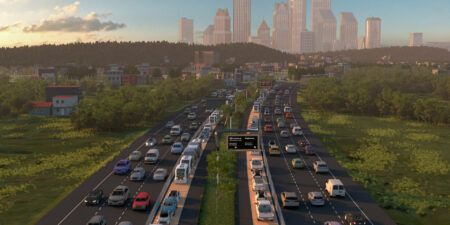The UK’s first collaborative trials of connected and autonomous vehicle (CAV) technology have been successfully completed, as UK Autodrive project partners Jaguar Land Rover (JLR), Ford and Tata Motors European Technical Center (TMETC) jointly demonstrated a number of future vehicle technologies at Horiba MIRA’s Proving Ground in Nuneaton, Warwickshire.
The demonstration came at the end of a fortnight of trials, in which the three vehicle manufacturers were able to successfully demonstrate the program’s first two connected car features. The first demonstration, Electronic Emergency Brake Light Assist, showcased cars that can warn their drivers when another connected car ahead has braked severely, lowering the risk of rear-end collisions when the driver’s view is obscured, for example, by fog or other vehicles.
The second demonstration, Green Light Optimal Speed Advisory (above), showed how connected cars can be sent information from traffic lights, allowing them to reduce the likelihood of meeting red lights, potentially improving future traffic flow and lowering emissions in urban areas. JLR also used the event to demonstrate a self-driving Range Rover that was able to overtake slower moving vehicles automatically using its Advanced Highway Assist feature, which will also reject overtake requests if it detects another vehicle in the occupant’s ‘blind spot’.
UK Autodrive is a consortium of leading technology and automotive businesses, local authorities and academic institutions, working together on a three-year UK trial of self-driving vehicle and connected car technologies. Further UK Autodrive trials and demonstrations are scheduled to take place at Horiba MIRA during the spring of 2017, before moving out onto closed-off areas of Milton Keynes and Coventry in late 2017. Technologies that will be trialled next year also warn drivers when another vehicle is blocking the junction ahead and when an ambulance, police car or fire truck is approaching; and prioritizes vehicles arriving at intersections without traffic signs or traffic lights. The project will culminate in a series of open road trials and demonstrations to be held in both cities in 2018.
“There has already been a lot of public focus on self-driving vehicles, but connected car technology may be just as revolutionary,” said Tim Armitage, Arup’s UK Autodrive project director. “The benefits of having cars that can communicate with each other and their surroundings could be very significant, from increased road safety to improved traffic flow, more efficient parking and better information for drivers.”
Tony Harper, head of research at JLR, commented, “We know that there’s a huge potential for these technologies in future vehicles around the world. Until now we have focused on communication between Jaguar and Land Rover vehicles, this collaborative approach is a major stepping stone toward all CAVs cooperating with each other in the future. Our aim is to give drivers exactly the right information at the right time, and collaborations with other manufacturers are essential to help us deliver this commitment to our customers.”




